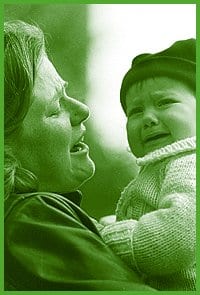As several high-profile legal and political victories have increased the rights of lesbian, gay and transsexual parents, some parents are finding that even though laws have changed, bureaucratic attitudes haven’t.
In Ontario, for instance, same-sex couples are able to adopt children jointly, and adopt each other’s biological children. Yet some lesbian parents are finding that when they try to access information, or go through the usual parental procedures, they are subject to conflicting information, lengthy delays and what they feel is discriminatory treatment.
Zoë Newman and her partner first ran into this last October when they tried to register the birth of their now three-month-old daughter, Sapphire, who was conceived with the sperm of an anonymous donor.
When babies are born in Ontario, parents must first register the live birth, with the names of the baby’s parents and the baby’s full name, then apply for a birth certificate.
“We wanted Sapphire to have my partner’s last name,” Newman says. “I contacted City Hall to see if we could register the baby with her last name, even though she’s not the biological mom, and I was told that would be fine.”
The couple filled out the forms, crossing out the line for “father,” noting that they were a same-sex couple, and filling in the baby’s full name. The form, which is ultimately processed by the provincial government’s Registrar General office, was sent back and the couple were instru-cted to leave the line for “father” blank and re-submit the forms.
Then in May, Newman’s partner adopted their daughter and the couple had to apply for a new birth certificate for Sapphire with both parents’ names. The forms were sent back because, they were told, they were filled out in black ink and looked like a photocopy. Newman’s lawyer suggested the couple fill them out again in red ink. The couple did, only to have them returned again, this time ostensibly because forms were to be filled out in “blue or black ink” only. Newman says she thought this was strange, since she had filled out the forms in black ink the first time. Then, on one of pages of her returned form, she found a Post-it note that read “send back, same-sex.”
“I was really upset when I saw that,” Newman says. “I called our lawyer and she was shocked. That note, which appears to have been sent to us unintentionally, makes the ink thing look trumped up. It seems like the procedure was being delayed because we are lesbians.”
No one from Ontario’s Ministry Of Consumer And Business Affairs, which administrates the office of the Registrar General, returned Xtra’s calls by press time.
Newman’s lawyer re-sent the application for Sapphire’s new birth certificate, filled out in blue ink, to the Registrar General. The couple is still waiting for their daughter’s birth certificate.
“I’m beginning to question whether getting Sapphire’s parentage established is ever going to happen,” Newman says. “It’s stressful on a practical level. We still feel like we are in limbo, legally. But on an emotional level, I was surprised how devastating this was. It felt like a denial of our family. At first I thought, this was just bureaucratic confusion or inefficiency. Now it feels like someone is purposefully stonewalling the process. And that feels like the worse kind of meanness and pettiness.”
Emily Paradis, another lesbian mom, says she and her partner also had forms returned when they first attempted to register the birth of their son Oscar, who is now almost three.
“We didn’t experience anything overt, but we did have a lot of delays and were often given conflicting information,” Paradis says. “We did wonder if it was homophobia. And, of course, for queer couples, the situation is much more charged. Until the adoption went through and until we had Oscar’s new birth certificate, I had no legal status. Every time there was a delay, we felt a lot of anxiety because was not recognizable to authorities as Oscar’s legal parent.”
Lesbian mothers in British Columbia recently celebrated a big victory in this regard. In January, a BC Human Rights Tribunal ruled that lesbian couples who have a child together with sperm from an anonymous donor can both register as parents on the child’s birth certificate, avoiding the hassle and expense of second-parent adoption.
Before, like in Ontario, the non-biological mother had to adopt the child of her partner in order to become the child’s legal parent. The Vital Statistics Agency had been returning applications by lesbian couples when they tried to both register as parents, stating that both parents had to be biologically related to the child.
“That was not only offensive,” says BC lawyer Barbara Findlay, who was counsel for the complainants, “it was wrong. Men were not being asked to prove that they were biologically related. This was a case of pure discrimination.”
The four lesbian mothers who filed a human rights complaint pointed out that neither the law, nor the form required both parents to be biologically related to the child. In fact, a sperm bank gave evidence that only 20 percent of assisted inseminations were to lesbian couples. The Vital Statistics Agency admitted it had never returned a form to straight couples, acknowledging that there was no way to tell whether the man listed on the form was the child’s biological father.
The tribunal held that it was discriminatory for the Vital Statistics Agency to refuse to register same-sex partners as parents in that circumstance. However, the BC government has asked for a judicial review of the decision.
This case is a significant one for lesbian parents, says Findlay. “The registration of a birth and the issuing of a birth certificate provides a child and its family with legal rights. If her name is not on her child’s birth certificate, the non-biological mom is in the position of a stranger to the child. She has no rights. In the six months or a year it might take for her to adopt her child, she has to hope nothing bad happens, because she can’t give medical consent for her child and she can’t take the child out of its jurisdiction. It’s a horrible legal limbo for lesbian mothers to be in.”
Findlay suggests that lesbian couples who conceive a child with anonymous sperm launch similar human rights complaints in every province and territory.
“When you register your child’s birth, put down both mother’s names as parents. If it’s returned, send it to you human rights commission with a note explaining you are filing a complaint on behalf of yourselves and your child. We shouldn’t experience this kind of discrimination and neither should our children.”
For more details of the BC case, go to www.barbarafindlay.com.
* For more on parenting, see the next item.


 Why you can trust Xtra
Why you can trust Xtra


